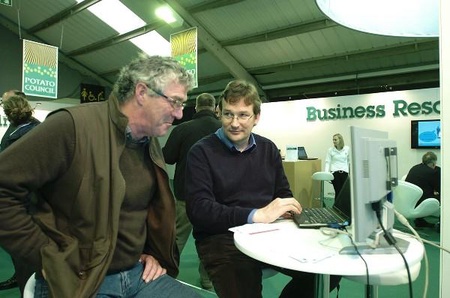A new institute to help farmers produce more efficiently and an updated software ‘tool’ that enables farming and food industries to calculate their carbon footprint are launched this week.
The Cool Farm Tool (CFT) was created by the University of Aberdeen in partnership with Unilever and the Sustainable Food Lab to guide farmers over their greenhouse gas emissions and to provide tips on how they might lessen their environmental impacts.
The computer-based tool - also aimed at processors and retailers with sustainability schemes - has already been successfully used by a number of market leaders including PepsiCo, Marks and Spencer and Costco.
CFT has also been widely piloted by farmers who have helped guide refinements and improvements of the updated version of CFT being launched this week.
The Cool Farm Tool Institute is a new virtual organisation with the mission of helping farmers and those businesses they supply make informed on-farm decision to reduce their environmental impact.
Although in the first phase it will primarily serve as a vehicle to distribute and support the use of CFT, it will also collate data and case studies to provide advice on best environmental practice for farmers.
CFT was developed by Dr Jon Hillier and Professor Pete Smith of the Environmental Modelling Group at the University of Aberdeen. The group has a global reputation and influence, with Professor Smith being the convening lead author for the mitigation chapter of several Intergovernmental Panel on Climate Change (IPCC) Assessment Reports and Science Director of Scotland's ClimateXChange.
Dr Hillier said: “The Cool Farm Tool is really easy to use and has been tested on real farms and within real companies.
“The open-source tool can be downloaded from the website of the new Cool Farm Tool Institute for free. The farmer or grower then enters their own data on how they are managing their crops or livestock such as; the kind and quantities of fertiliser they are using, livestock feed, and energy used in field machinery operation, animal housing, and on-site storage or processing.
“The tool then provides a tailored emissions profile and suggests likely beneficial mitigation options, such as the use of more efficient fertilisers, using different technologies, better soil carbon management, or looking again at the energy they are using for storage.
“Emissions from agricultural production are difficult to quantify due to geographic variability and differences in practice between land users.
“Many retailers and processors have ambitious sustainability programmes but have no means to calculate on-farm emissions which limits their understanding of prevalent practices or opportunities for introducing change.
“Cool Farm Tool is a farmer-friendly greenhouse gas calculator which will allow estimation of a greenhouse gas footprint within minutes, and then provides the opportunity to test and compare other more sustainable options.”
Dr Hillier added: “Cool Farm Tool will be available via the Cool Farm Institute which has been founded with the initial support of PepsiCo, Unilever, Marks and Spencer, Tesco and Yara. The institute fundamentally believes that more can be achieved by collaboration with and across industry; working together to share methods, knowledge and findings.”
*Some examples of CFT users:
· PepsiCo have embedded the Cool Farm Tool in their 50-in-5 target - reducing carbon emissions and water use by 50% in five years. They have used the software on more than 80 UK potato farms this year for Walkers crisps, which has lead to benchmarking and the development of carbon action plans, both for the organisation and for individual farmers. PepsiCo plan to expand to other crops within their Quaker Oats and Copella brands. “I like the [Cool Farm Tool] because it’s not a black box. With other tools you can’t do the what-if scenarios. You just pay for the study and are delivered the results. This is a better way of engaging farmers and helping them to prioritize options. Other tools we've used give generic mitigation options copied and pasted from elsewhere and don't always apply to the particular farm in question. ” Mark Pettigrew, Pepsico
- Using the software Marks and Spencer with WWF-India have assessed and compared Indian cotton within and outside the Better Cotton Initiative (http://www.bettercotton.org/) in which they participate, and demonstrated a clear difference in greenhouse gas (GHG) impacts between farms inside and outside the initiative.
- Costco have assessed GHG emissions from organic egg production in the US, leading to an understanding of how both geography and management practices affect emissions. This led to identification of practical mitigation options, which their farmers are now in the process of evaluating. Costco also organised a live GHG assessment meeting with the farmers representing the country’s entire supply of organic eggs to Costco stores. These growers were able to see how their practices measured up against other farmer’s practices and share tips and ideas for GHG emissions reductions.
- A Netherlands based consultancy which operates mainly in developing countries have, by using the tool, been able to demonstrate to cooperatives of small scale Kenyan tea producers, how optimal strategies for residue management lead to high and more stable yields allied with a 30% reduction in GHG emissions from the harvested leaves.
- The Potato Council organised a “live” farmer footprinting session as part of a major industry showcase event. Farmers, consultants, and fertiliser companies were present to assess their own practices, see how emissions varied between farms, and how recent improvements in fertiliser efficiency can lead to substantially lower carbon footprints per tonne of crop produced.


